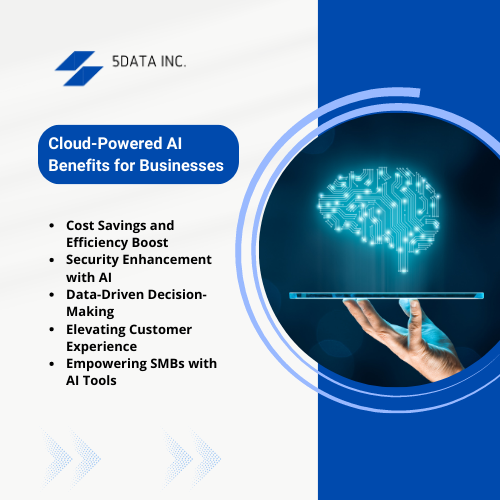Artificial Intelligence And Cloud Computing
AI has transformed businesses’ operations, helping them achieve greater accuracy and efficiency with machine learning applications and make better decisions with big data analytics. Cloud computing is a popular platform that many organizations use to mine external data and leverage the potential of AI.
Cloud computing offers numerous advantages to businesses, including remote storage and access to data and applications, making it an excellent choice for implementing AI. With the cloud, businesses can deploy applications and AI models, adjust them as needed, and access a wide range of cloud-based tools and services that improve the quality of their AI models. Custom application development services assist organizations in integrating the benefits of the cloud with AI.
Integrating artificial intelligence with cloud computing can greatly benefit businesses by improving automation, human capabilities, decision-making accuracy, customer satisfaction, and security. The integration creates an AI program of valuable opportunities for organizations seeking to leverage the advantages of AI. Enterprises can make the most of these benefits to add significant value to their operations.
Cloud-Powered AI Benefits For Businesses
1. Cost Savings and Efficiency Boost: AI-powered automated business processes and cognitive capabilities can significantly reduce business costs while improving the overall efficiency of business processes. Retail businesses, for instance, can use automated demand prediction, inventory optimization, and order fulfillment using cognitive technologies to streamline their supply chain management and achieve greater customer satisfaction at a lower expense. Automated functional testing assists businesses in merging these technologies.
2. Security Enhancement with AI: Improving security in cloud-based businesses can be achieved with the help of AI and cognitive technology. Cyber threats can be detected and responded to in real-time through AI-powered security tools, minimizing the risk of data breaches and other security incidents.
3. Data-Driven Decision-Making: Businesses can benefit from cloud AI by using traditional analytics and data science, enhancing their decision-making process. AI-powered analytics and computer science can provide valuable insights and predictions based on data, enabling enterprises to make more informed decisions.
4. Elevating Customer Experience: Businesses can benefit from using AI in the cloud to enhance their customer experience. Companies can offer round-the-clock customer support, quicker response times, and customized customer interactions using intelligent automation, AI-powered chatbots, and virtual assistants. Financial services companies can use AI solutions or an AI-driven chatbot to provide personalized financial guidance to customers, leading to better customer satisfaction and loyalty.
5. Empowering SMBs with AI Tools: Small and medium-sized businesses (SMBs) can benefit from AI-powered tools, products, and services that cloud providers offer. These tools can help SMBs automate processes, make better decisions, save costs, and improve customer experience. Pay-as-you-go pricing models also make it easy for SMBs to start with small AI projects and scale up as they grow. With the best mobile app development companies, the accessibility and affordability of AI in the cloud are not limited to large enterprises

AI’s Business Value Generation Methods
1. The Value Generation Cycle: Businesses should adopt a cyclical approach to AI solutions, incorporating data, insights, strategy, action, and deep learning to provide flexible AI-driven experiences and reduce human interventions. This approach will help determine the appropriate times to automate tasks and when to use deep learning. Organizations can identify opportunities to create value by analyzing data and work complexity.
2. The Cognitive Model: Cognitive technology, or AI, extracts new intelligence from massive amounts of data and generates predictive insights on a large scale. It amplifies human cognitive abilities to drive business solutions, with three main branches of value across industries.
Cognitive engagement can aid digital transactions and business functions and provide valuable insights to ease human stress. Cognitive automation can also simplify processes without human intervention. By using cognitive insights and knowledge, overwhelmed individuals can receive helpful information. Furthermore, cognitive automation mimics human intelligence, assisting in complex business decisions without the human brain.
By building a strong digital infrastructure incorporating cloud computing, data analytics, and cybersecurity measures for AI investments, integrating AI technology from a cognitive perspective can enhance business outcomes and promote the expansion of AI investment.
3. Result and Impact Model
The Result and Impact Model helps organizations categorize the business value of AI based on its output and financial contribution. It guides the development and evaluation of data of the business landscape of AI applications.
Steps for Implementing Cloud-Based AI in Businesses
Discover how AI can help solve business problems through automating and improving processes, training AI models with relevant data sources and business problems, and setting measurable KPIs to evaluate the effectiveness of business models.
- Once the business problems have been identified, the next step in the business case is to create an AI strategy. This action includes selecting a suitable cloud platform and AI tools that align human capabilities and AI capabilities with business needs, defining the AI use cases and workflows, and establishing a data governance framework to ensure data privacy and security.
- Businesses must invest in talent for successful AI initiatives, such as hiring machine learning engineers, data scientists, and AI professionals who can develop and deploy AI models to attain competitive advantage. Additionally top rapid application development companies with human expertise who can manage cloud infrastructure and security are essential.
- To gauge the effectiveness of their AI efforts, business leaders and businesses should keep tabs on the key performance indicators (KPIs) they have identified. Monitoring the performance of AI models, calculating AI systems’ return on investment (ROI), and adjusting the business leader’s AI strategy based on the outcomes.
5Data Inc As Service Providers
The organization specializes in scalable application development, focusing on security and dependability. Their support includes requirement gathering, design, development, testing, and deployment. A team of diverse skills enables the organization to design strong architecture for quickly scaling software applications and assisting businesses.

